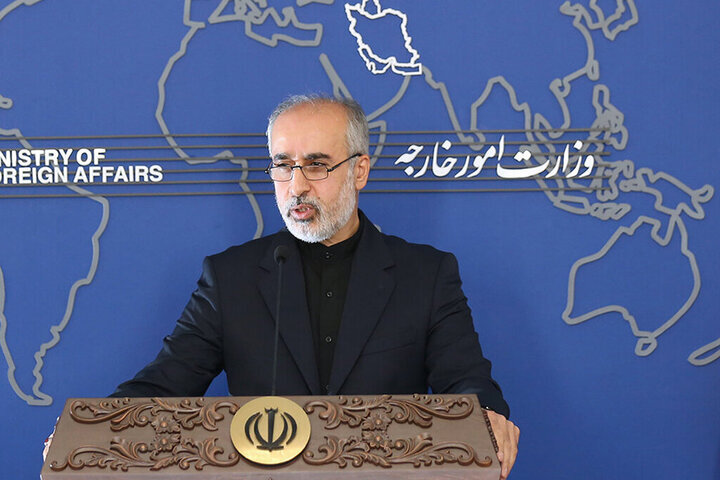E3 should take responsibility if it follows Israel’s direction: Iran

TEHRAN- The three European signatories to the 2015 nuclear agreement have come under fire from Iran for their most recent “unconstructive” and “ill-considered” comments.
Iran said on Saturday the E3 must accept the consequences if it continues to follow Israel's approach.
Nasser Kanaani, the spokesperson for the Iranian Foreign Ministry, stated that it is regretful that the three European nations (France, Britain, and Germany) have followed in the footsteps of the Zionist regime along a route that may lead to the collapse of negotiations.
"It is apparent that the E3 should also assume responsibility for its implications if such an approach persists," he continued.
Kanaani cautioned the European trio against falling prey to outsiders who have opposed the talks and are now attempting to sabotage them at all costs.
He emphasized that it is “surprising” that the E3 has made such a statement, regardless of the outcome-oriented approach sought in the negotiations, especially at a time when diplomatic efforts and interactions are afoot between the negotiating parties and the coordinator of the talks to revive the nuclear deal, officially known as the Joint Comprehensive Plan of Action (JCPOA).
“The U.S. maximum failure in the maximum pressure campaign should be a lesson for all parties who unwittingly think that threats and sanctions can prevent the Iranian people from pursuing their maximum rights and securing their interests,” Foreign Ministry spokesman Kanaani remarked.
The spokesman emphasized Iran's “goodwill and genuine intention” to reach a final deal on the lifting of sanctions, saying the Islamic Republic's actions and plans were responsible for success of the negotiation parties at various points.
The official advised the E3 to play a more active role in providing a solution to end a few remaining points of disagreement instead of entering the phase of destroying the diplomatic process, pointing to the E3's inaction in recent months and its “politically motivated” move to propose a resolution against Iran, which was approved by the International Atomic Energy Agency (IAEA) Board of Governors in June.
Kanaani stated that Iran has cooperated constructively with the IAEA as a responsible NPT signatory and once again emphasized the significance of refraining from actions driven by politics and making unfounded allegations against the Islamic Republic.
"It is regrettable that European countries oppose the Islamic Republic of Iran's entirely peaceful nuclear program, which has been subject to the most thorough IAEA inspections, while on the other hand fully supporting a regime that has hundreds of nuclear warheads and refuses to abide by any international non-proliferation mechanisms," the spokesman continued.
He recommended the Europeans to make up for their failure to uphold their commitments toward the Iranian nation and to refrain from using threatening rhetoric.
“The U.S. maximum failure in the maximum pressure campaign should be a lesson for all parties who unwittingly think that threats and sanctions can prevent the Iranian people from pursuing their maximum rights and securing their interests,” Kanaani remarked.
He reiterated Iran's willingness to clinch a deal on the restoration of the JCPOA and said it is feasible to come to an agreement swiftly provided there is the required desire and resistance to outside pressure.
In a press release on Saturday, France, Britain, and Germany expressed serious concerns about Iran's intentions and commitment to a successful resolution of the JCPOA.
They claimed that Tehran's stance conflicts with its legally binding obligations and jeopardizes the chances of reviving the nuclear agreement.
The European side said that, along with the other signatories to the agreement and the United States, they had negotiated with Iran in good faith since April 2021 to restore and fully execute the JCPOA.
Under former President Donald Trump, the United States abandoned the accord in May 2018 and reintroduced unilateral penalties that the pact had eased.
In May 2018, the United States, then led by former President Donald Trump, renounced the accord and reinstituted the unilateral sanctions that it had withdrawn.
In April of last year, months after Joe Biden succeeded Trump, the negotiations to save the deal began in Vienna, Austria, with the goal of determining how seriously Washington intended to rejoin the pact and lift sanctions against Iran.
Despite significant advancement, the lengthy negotiations were often interrupted by the U.S. indecision and delay.
On August 8, after four days of difficult negotiations between Iran's representatives and other negotiating partners, a revised document put forth by the EU was on the table.
On August 15, a week after the conclusion of the most recent round of negotiations, Iran sent its response to the EU draft proposal. Following the submission of its reply, Tehran encouraged Washington to be realistic and flexible in order to establish a compromise.
The Biden administration's answer to Iran's remarks on the EU draft was sent over 10 days later.
After a full examination of the U.S. response, on September 1 Iran answered back and is now awaiting a response by Washington.
Leave a Comment